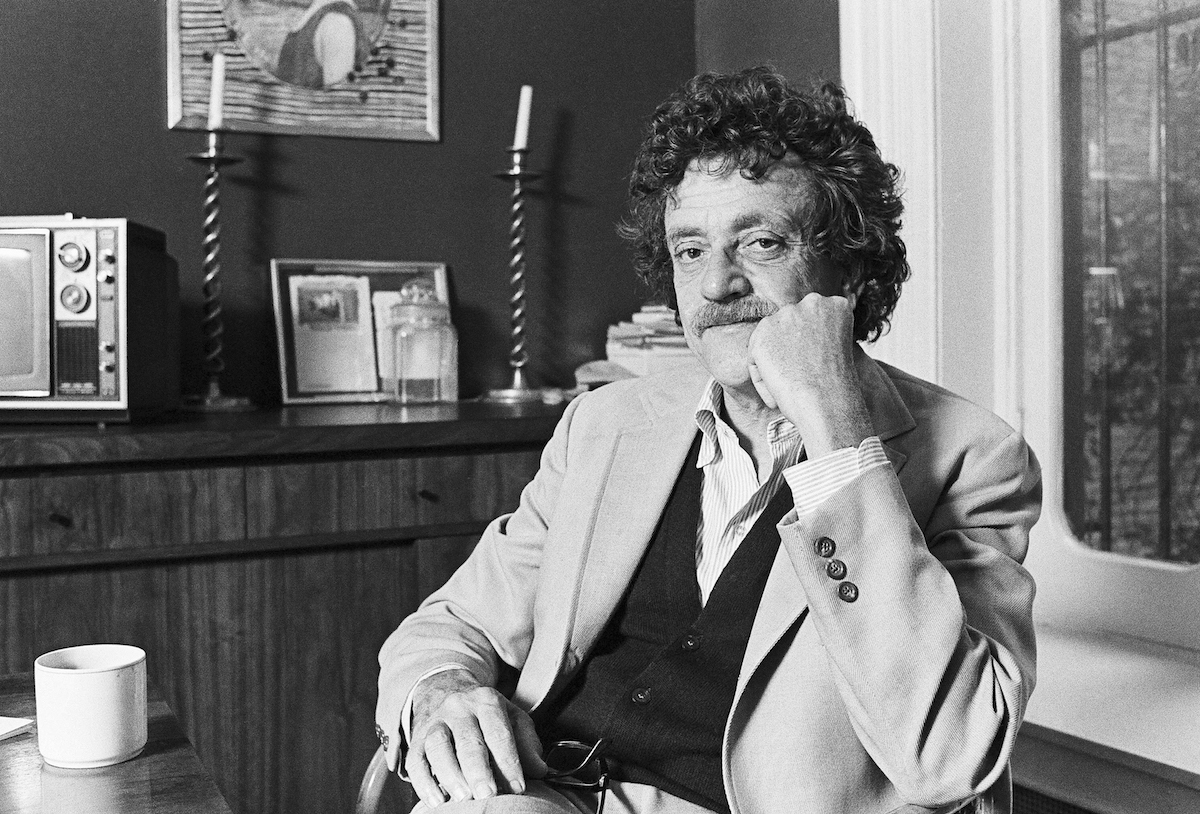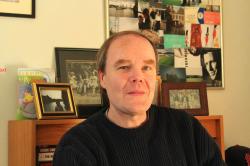What would Kurt Vonnegut have made of the accordion-style cycle of lockdowns and other restraints imposed on us by the seemingly permanent American sanitary dictatorship devoted to the religion of health in this the centenary year of his birth? Would he have joined the likes of Neil Young and others of the generation of free love and open expression in becoming the sort of shrill, get-with-the-program authoritarian chorus they once warned us about? And might Vonnegut have agreed with the notion that each free-born citizen bears the moral obligation to contribute to the realization of (poignant phrase) “herd immunity” by accepting the state’s coercive vaccination policies? In short, would the author of 1963’s Cat’s Cradle and other cautionary tales of the arrogance of scientism now be using one of his celebrated commencement addresses to demand our fealty to Dr. Fauci and the continuing self-imposed American dystopia?
The answer to these and other pertinent questions is: One doubts it, but of course we can never know. And that’s a serious shame. Politicians have had a lot to say about our emotional lives recently, but authors have largely remained quiet. Again, we can only conjecture, but had Vonnegut lived to see the day when American schoolchildren sit muffled behind masks, forbidden or afraid to interact with each other—by no means the only dismal emblem of our times, if surely the most pitiful—it seems to me a fair bet he would have felt moved to comment. Consider the evidence. Vonnegut, who died in 2007 at the age of 84, was many things in his life. War veteran. Trained mechanical engineer. Crime reporter. Corporate shill. Car salesman. But perhaps his greatest contribution to humanity was the way in which he relentlessly mocked the presumptions of the ruling elite. The absolute refusal to accept handed-down truths—whether in politics, science, or art—remains the constant in Vonnegut’s life and work. He was not the sort of man who believed that anyone should enforce his or her concept of the guardrails defining the limits of admissible behavior on anyone else.
Here is Vonnegut from his debut novel, 1952’s Player Piano:
The sovereignty of the United States resides in the people, not in the machines, and it’s the people’s to take back if they so wish. The machines … have exceeded the personal sovereignty willingly surrendered to them by the American people for the good government. Machines and organizations and pursuit of efficiency have robbed the American people of liberty and the pursuit of happiness.
Or from the same book: “Out on the edge you see all kinds of things you can’t see from the center … Big, undreamed-of things. The people on the edge see them first.”
And, perhaps most apropos, the author himself, speaking in 1986 to a U.S. Senate subcommittee debating whether to bar foreign visitors whose views might be uncongenial to the government:
All citizens are entitled to hear and state any idea anyone from anywhere may care to express. And where did I get the notion that there was such an incredible entitlement? I got it from the junior civics course that was given in the seventh grade at Public School 35 in Indianapolis.
Where does one begin in assessing Vonnegut as an author, as opposed to the sort of wooly-haired national uncle figure who might enliven your college graduation day with a few well-chosen remarks in his preferred tone of deadpan farce? Perhaps with the sheer breadth of his oeuvre. There are writers whose last book is very like their first. Having learned their trade, mastered it for once and all, they practice it with little variation to the end. Vonnegut was more of the performing-flea school, moving from slightly dotty time-traveling science fiction to pity-of-it-all war horror and back again, all leavened by a series of gentle but haunting fables about the chimerical fantasies that made life bearable to him. His stocks in trade were slim books with short chapters and snappy sentences that jumped wherever the author’s consciousness took him. He wasn’t one to make a fetish out of repetition.
The Sirens of Titan (1959) marks the first jelling of the Vonnegut world, and Slaughterhouse-Five, a decade later, the best delineation of the basic style, fizzing with ideas to the point of genius or idiocy, that fixed his legend. The latter novel violates most of the conventions of the genre by telling the reader what will happen to each significant character and situation before he or she comes to read the scene. The fact of the central character’s continued survival amid the horrors raining down from the Allied bombers over Dresden (Vonnegut was there, as a German prisoner of war) is the hook that keeps propelling the story forward. It’s a literary highwire act that involves, among other feats, the use of flashbacks, fast cuts, and surrealistic detours behind a Hemingwayesque façade of short, declarative sentences, and that also includes a sideshow of time travel and alien abductions, with fourth-wall-breaking cameo appearances by the author himself. At the opening of the last chapter, Vonnegut surfaces to tell the reader that it is now 1968 and Robert Kennedy was shot two nights earlier. “Martin Luther King was shot a month ago. He died, too. So it goes.”
Vonnegut Among the Greats
Where does Vonnegut rank in the American literary pantheon? These things are necessarily subjective, but perhaps his closest peer would be Joseph Heller, and more specifically the energetically sustained gallows humor of Catch-22. Both authors mined a basic lode of antiwar satire, with a rich seam of absurdism, but Heller was the more slapstick in his approach. His humor was of the pie-in-the-face school, Vonnegut’s more arch and detached. If Heller was Jerry Lewis, then Vonnegut was Dean Martin.
Gore Vidal thought Vonnegut was “exceptionally imaginative,” which was intoxicatingly high praise coming from that quarter, while Norman Mailer hailed him as “a marvelous writer with a style that remained undeniably and imperturbably his own.” That other daring young man on the 1960s literary trapeze, Tom Wolfe, allowed that Vonnegut “could be extremely funny, but there was a vein of iron always underneath it which made him remarkable.” Of course all these words were spoken by way of eulogies, when, with a few notable exceptions, the notoriously venomous literary fraternity treat a fallen colleague with a respect that’s as exaggerated as, a day or two earlier, it would have been astonishing. (Vidal had once described the author of the “unreadable” Slaughterhouse-Five as “the worst writer in America.”) It would be easy to forget that, for much of his career, especially at the time Hollywood came calling for his work, Vonnegut was the lowbrow’s comfort and the highbrow’s butt. Set on the broader canvas of Western literature, we can glimpse in Vonnegut some of Mark Twain’s disenchanted idealism, and of H.L. Mencken’s world-weary irony, while there’s surely something about Billy Pilgrim’s progress in Slaughterhouse-Five that recalls one of Samuel Beckett’s surrealistic clowns, shambling through a barren, bombed-out landscape, the human punchline of some cosmic jest of unfathomable cruelty.
If you’re almost any sort of book buff, there’s clearly a frisson of pleasure to be had from watching the filmmaker Robert Weide’s new documentary Kurt Vonnegut: Unstuck in Time. Vonnegut was an impressive figure in the flesh: Everything about him conveyed a sort of Yoda-like intelligence along with hidden reserves of writerly gravitas. If you happened to have seen him standing on the other side of a room at a party, you’d be fairly confident that you had arrived.
The problem is that, as prefigured by its title (which Weide borrows from the opening to Slaughterhouse-Five), Unstuck in Timetakes a number of liberties with conventional sequencing. It’s like a series of artfully shot scenes bouncing around in search of a movie. There are clips of Vonnegut doing or saying something—often the identical thing—from different decades, a few animated sequences where the author’s accomplished doodles spring to life, closeups of pens and typewriters, playbacks of significant phone messages, all by themselves the kind of “Great! We’ve got to get that in the picture” ideas that people rave about at script conference time. But cumulatively they don’t always add up to a coherent film. I might add, too, that Weide, who helmed several episodes of Curb Your Enthusiasm, includes rather a lot of himself as well as his subject. “I didn’t even want to be in this in the first place,” he announces at one point, which seems a little disingenuous coming from a veteran director who lovingly shows us closeups of him and his subject, arms around each other’s backs, or has the camera linger over the Victorian candlesticks Vonnegut gave him and his wife for their wedding.
Unstuck in Time is really two films. There’s the lovingly made tribute to Vonnegut and his creative process, and there’s a more self-referential project which amounts to a documentary about the making of a documentary. At the end of the two hours, I was left thinking that Vonnegut was clearly a troubled but genial soul, as well as a prodigiously gifted writer who worked, for the most part, with received ideas. His genius was not to challenge or overturn those ideas, but greatly to extend and enrich them. For me he stands at the top of the second division of American literary humorists, in a league still led by Twain, with O. Henry close behind. Based on what we see here, I would have liked to have known him. One summer about 20 years ago I sent him a copy of The Sirens of Titan, and several months later Vonnegut sent it back inscribed “Merry Christmas” over a deft little self-portrait and his signature, but that was as close as I ever came. So it goes.

